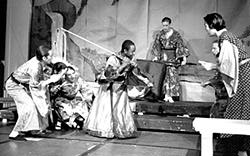|
News
|
|
|
Perspectives
|
|
|
Arts
|
|
|
Sports
|
|
|
Other
|
|

Mikado Provides Comical, Complicated Tale
by Lauren Goodman
The Oberlin Gilbert and Sullivan Players (OGASP) have done themselves proud with this weekend's lively production of The Mikado, Gilbert and Sullivan's most popular operetta. It successfully tells the complicated, comical tale of a wandering minstrel, a Lord High Executioner, the woman they both love and the Emperor who rules over them all.
More subtly, it also successfully satirizes Victorian society through its characters. Senior Jon Stinson's portrayal of Pooh-Bah, a nearly schizophrenic bureaucrat, is the most obviously satirical character, but he is not the only one. The Mikado himself, played by sophomore Frederick Jackson, is also a mockery of British leaders of the time, and really of politicians in all times.

|
|
Trip to Japan: Oberlin Gilbert and Sullivan Players present The Mikado tonight and Saturday night at Wilder Main Space. The play is a complex satire of the Victorian era set in traditional Japan. (photo by Brian Hodgkin) |
In truly sardonic D'Oyly Carte fashion, roughly half of the cast is blonde. This may be accidental, but it is a perfect touch. Similarly, the costumes are related to the Victorian idea of what Japanese art and culture was like.
The set, though minimal, is very appropriate and is particularly well integrated into the blocking, and the lighting is equally effective. This production of The Mikado also boasts a new spatial arrangement for OGASP in Wilder Main, which is a very effective use of one of the worst performance spaces that student groups must endure.
The use of props - mostly fans and parasols - adds a perfect touch to this Victorian idea. The cast completely integrates the fans and parasols into their characterizations and the result is extraordinary. The choreography, partly based on these props, is generally very good. Unfortunately, it becomes repetitive and remains so. During a few of the songs, the movements border on the too-loud and too-active for the cast to remain singing. However, the choreography effectively demonstrates that this is a Victorian version of Japan.
The men's chorus opens the show with a spirited "If You Want to Know Who We Are," and the plot complications start to fly, leading to some of the best paradoxes Gilbert and Sullivan have to offer. Pooh-Bah and Pish-Tush, a noble lord played skillfully by sophomore Benjamin Schaffer, lead the chorus. Schaffer portrays Pish-Tush as a fascinating quiet, shrewd political figure.
Enter the wandering minstrel, Nanki-Poo, played with bright-eyed enthusiasm by first-year Joseph Holmes, who loves the beautiful young Yum-Yum, junior Marie McCarville. Unfortunately, Yum-Yum is betrothed to Ko-Ko, enchanting senior Kevin Moreno.
One of the most fascinating characters is Katisha, an elderly lady played by Elizabeth DeShong, a first-year, who really seems old. This is especially impressive considering that DeShong is among the youngest cast members.
Also enchanting is the women's chorus, which blushes and twirls parasols in unison in a remarkably stylized fashion. As part of the chorus and as a lead in her own right, Yum-Yum's sister Pitti-Sing, as played by first-year Sarah Stankiewicz, nearly steals the show with witty facial expressions and fan assaults.
The vast number of voice majors in the cast also boosts the appeal of this show. "Brightly Dawns Our Wedding Day" is the most beautiful song because of the incredible vocal blend that McCarville, Stankiewicz, Holmes and Schaffer achieve.Not all of the songs are as well done as "Brightly Dawns," partly because ensemble numbers tend to include movement that dampens the lyrics. Unfortunately, the large pit does occasionally overpower the relatively small cast.
Music Director David Kurtenbach, a sophomore, has some difficulty controlling the orchestra's volume when accompanying singers. However, the pit is lush and exciting in orchestral pieces, with glorious brass, beautiful strings and delightful winds. Conservatory first-year oboist Michael Daniels and College first-year trumpeter Elizabeth Walker have gorgeous solos in the overture, and the familiar, light-hearted score is a pleasure.
Director Jennifer Spitulnik, a junior, has brought to life a fantastic and funny look at politics, culture, and society in general. Forget starting papers or studying for exams; OGASP's production of The Mikado is not to be missed.
The Mikado is tonight and Saturday at 7:30 p.m. in Wilder Main Space.
Copyright © 2000, The Oberlin Review.
Volume 128, Number 23, May 5, 2000
Contact us with your comments and suggestions.